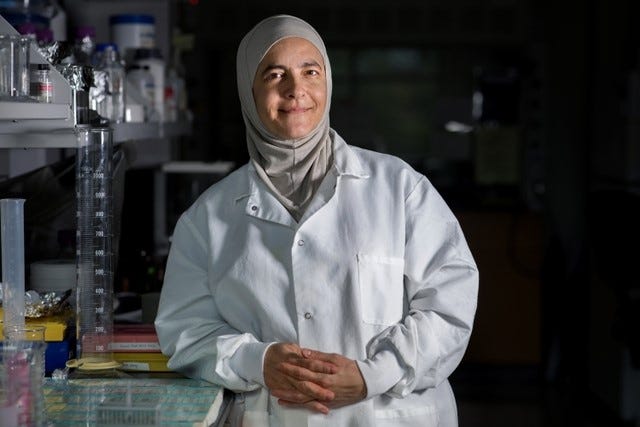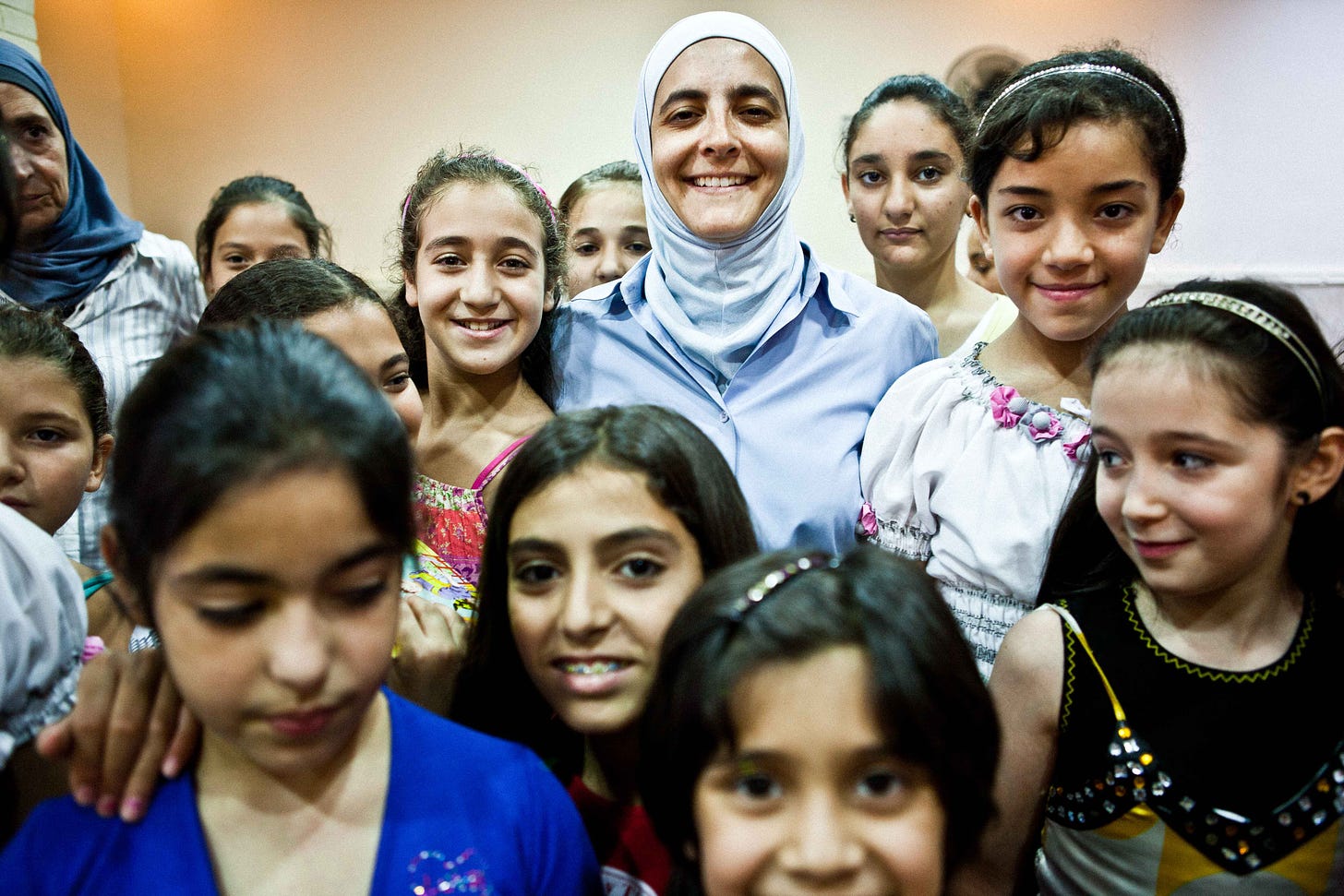'Rootedness in the face of atrocity'
5 questions for Palestinian epigeneticist and educator Dr. Rana Dajani
A couple of months ago I was sitting in a conference room, listening to a panel on trauma, and a woman stood up and asked a question during the Q&A that took my breath away. As I remember it, she asked something along the lines of—how are we thinking about the epigenetic fall out of the current genocide in Gaza, and the various violent conflicts sprouting up all over the world? What do we know about how to buffer the harm to children? Why aren’t we talking about this in every room?
I was already heartbroken and enraged about the headlines, particularly the terrorism and genocide unfolding in the Middle East, but beyond, too. The way in which this woman painted a picture of the generations of deleterious impact that we are seeing seeded offered a whole new dimension of reckoning. I knew I wanted to talk more with her about her expertise, her experience, and her way of seeing a more gentle, humane future. Meet Dr. Rana Dajani…
Courtney Martin: One of many things you are is a scientist who studies epigenetics. I learned of your work at a conference where you invoked the epigentic trauma risk to children in Gaza right now. Can you explain what epigentics is and tell us more about that lens on what’s happening now?
Dr. Rana Dajani: A human being manifests herself to the world as a result of a combination of 1) the genes she inherits from her parents, 2) the environment around her and, 3) the complex interaction between the two. Epigenetics is how the environment impacts genes. Your DNA does not change; the sequence is the same. The environment results in changes that turn on or off genes. We still don’t understand what that means exactly, but because the science is still early, it offers a window of opportunity to reshape the field with a framework that is closer to nature and offers humans dignity and agency instead of victimhood and vulnerability.
What is happening in Palestine today, and has been ongoing for the past 75 years, is a continuous exposure to violent trauma across multiple generations. As science advances, scientists across disciplines try to understand how such experiences impact children and adults. What is emerging is the tenacity of humans, which has a term in Arabic which is smoud. This means a person exhibits rootedness in the face of atrocities in a positive way.
I am interested in understanding this concept and how it is developed, nurtured and fostered and what factors affect it, including faith and community and how it can be connected to epigenetics.
You also care deeply about the power of the story. In what ways can stories heal our epigenetic trauma and what are its limitations?
First of all epigenetic trauma is not necessarily negative or positive. I would like to frame epigenetic signatures of trauma as a way nature makes us more agile, flexible, and comfortable with change and ambiguity, which helps us survive. This is stepping back from a binary view of the world to a more comprehensive, fluid view of the world that is more similar to nature, which is never binary but always a spectrum of any trait.
If we adopt such a world view then we can tell stories that convey these concepts and view points to celebrate diversity and pluralism. We can capitalize on two traits that were key to our survival as humans: storytelling and community. Such an approach comes from a perspective of agency and dignity.
What can those of us feeling outraged and brokenhearted by what is happening to children in the Middle East right now do that would be meaningful and/or contribute to healing?
At this point we need to work on stopping the root cause, which is the violence itself. One can do that by demanding a cease fire, stopping the selling of arms and holding perpetuators accountable by demanding the upholding of international law.
These may seem like lofty goals, but there are simple things we can do starting from speaking up about the truth of what is happening in every gathering and platform we exist on (speaking truth to power) and boycotting all products that are made by Israeli government supported companies. There are many apps where we can identify such products.
Do not underestimate the power of one individual. If this was not a form of power it would not be silenced and attacked.
You say that we owe the future generation stories of who we are. What is a story of healing in your own life that you want your descendants to carry with them?
When we have common cause for justice for humanity this brings out the best of us and the traits that made us as humans survive, thrive, and flourish appear and start spreading amongst us. Today, the call for peace has spread all over the world like a good virus. It is amazing and so heartwarming. This moment has shown us what the best of humanity is capable of, and the worst. The price is high, but we have learned from history that is always the case. The oppressor does not give up easily.
I take solace learning of the amazing Palestinian women, children, and men, and all they are doing to survive together as a community inside Palestine, and the solidarity all over the world of human beings from all walks of life, literally.
It brings back the faith in humanity.
You are a woman who, as you put it, “wears many scarves”—scientist, educator, mother, social entrepreneur. How do you decide where to put your precious energy?
I put my energy in what I believe in and have a passion for that makes me not sleep at night and wakes me up early in the morning, and where there is the least support and the least people. I don’t think of how I am going to solve the whole problem. I think what can I do now? And focus on that. It is the butterfly effect (the chaos theory in physics) when a butterfly flutters its wings it moves the air a centimeter that results in a hurricane beyond time and space. I draw from my religion as a Muslim that everyone is a guardian and not to belittle any small good deed. I am not responsible to bring about the results; I am only responsible to try.
There is no excuse for anyone not to try.
We will be donating to We Love Reading in honor of Dr. Dajani’s labor.






This is a fantastic interview with Dr. Dajani. She’s absolutely heroic and indispensable as an educator and practitioner. Thank you! I’m donating to her cause.
I believe that we need to reach out more to the American Jewish community so I gave talks to Rabbi Sharon Kleinbaum’s synagogue in NYC last April. This congregation is stellar and deserves support.
She graduated from Barnard in ‘81 and served as a rabbi for 32 years at this synagogue. She urges a ceasefire and works with peace groups in Israel to achieve it. The point is that there are prominent Jewish leaders here striving for peace. DD
I want this epigenetic conversation to happen in every space around the world . Not because I imagine it will immediately bring about change but that change based on understanding deeply how deeply war harms children everywhere. Eventually humans might remember childhood so they demand other means to make change in our humanity , living and breathing in harm or health each day.